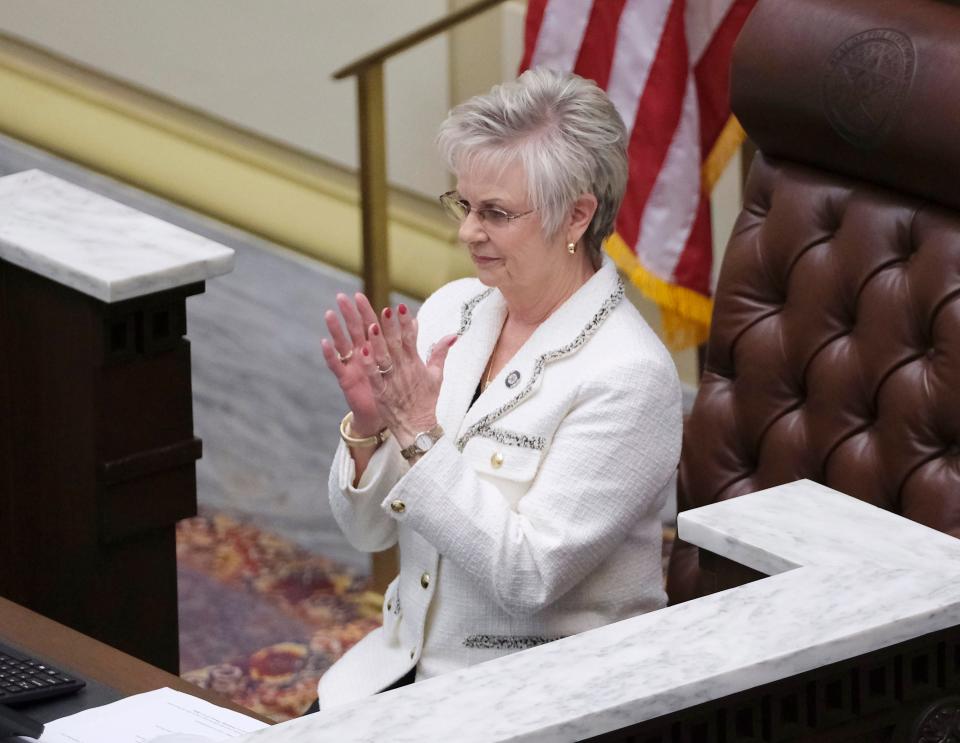Ohio voted to establish abortion rights in the state constitution. Could Oklahoma do the same?
- Oops!Something went wrong.Please try again later.
The battle to build abortion rights into the Ohio Constitution has been closely watched in Oklahoma.
Both are strongly Republican states with highly restrictive abortion laws. Both are states that backed former President Donald Trump twice.
But on Tuesday, Ohio voters approved by a strong margin a state constitutional amendment to protect abortion rights that in effect bypassed the heavily Republican state Legislature and overcame the opposition of Republican state officials, including Gov. Mike DeWine, who called it "a radical proposal."
The amendment gives Ohioans the constitutional right "to make and carry out one's own reproductive decisions, including but not limited to decisions about abortion, contraception, fertility treatment, miscarriage, care and continuing pregnancy." It allows the state to restrict abortion after fetal viability, except when "necessary to protect the pregnant patient's life or health."
"We know this was a hard-fought victory in Ohio. And it’s theirs to celebrate," said Chelsea Abney, speaking on behalf of the board of directors of "We Are Rising," an Oklahoma City group founded after the U.S. Supreme Court overturned Roe v. Wade last year.

"Here in Oklahoma, this victory means our work of having conversations around the kitchen tables of women across Oklahoma must continue and in fact, are more important than ever," Abney said. "We’re inspired by Ohio to keep working until all Oklahomans have the opportunity to decide this issue for ourselves."
What are abortion advocates, lawmakers doing in Oklahoma?
We Are Rising is considered by many to be one of the groups most likely to coordinate a petition effort in Oklahoma, although the head of the group, Liz McLaughlin, of Oklahoma City, has said, "Our preference is to work with lawmakers to accomplish these goals."
Rep. Mickey Dollens, D-Oklahoma City, a Democratic leader in the state House, said that with legislative elections coming up in 2024 he doubted that "the political courage is there" for any Republicans to introduce a more moderate abortion law in next year's session.
State Sen. Julie Daniels, R-Bartlesville, was the author of restrictive abortion bills passed by the Legislature, signed by the governor, but overturned by the state Supreme Court earlier this year.

"I am deeply saddened by the decision of Ohio voters to enact a right to abortion under any circumstances up until the time of birth," Daniels said. "Oklahoma is a much more pro-life state than Ohio. There is broad support here for limited access to abortions, only allowed to save the life of the mother, and our laws reflect that."
She added: "We must persuade Oklahoma voters to ignore the lies of the left, to hold firm to the truth that an unborn child is indeed a child, that abortion is not birth control, that we must protect the safety of women subjected to these dangerous, life-changing procedures."
What is the current law regarding abortion in Oklahoma?
The state Supreme Court decision left Oklahoma with a law dating back to 1910 that punishes a person with two to five years in prison for administering or advising a person to end a pregnancy at any point unless it is "necessary to preserve her life."
The court said the Oklahoma Constitution includes the right to end a pregnancy "at any point" if a physician believes the continuation of pregnancy would endanger the woman's life. It also said "absolute certainty is not required" and that a person does not have to be near death for a pregnancy to be terminated.
However, concerns have been raised that fear of prosecution might cause care to be withheld for women with pregnancy complications.
Jaci Statton, a 26-year-old woman from Meeker, filed a complaint in September with the U.S. Department of Health and Human Services arguing that the University of Oklahoma Medical Center and Oklahoma Children's Hospital violated the Emergency Medical Treatment and Labor Act (EMTALA) by denying her an abortion that had been recommended by her doctor.

"Our physicians and staff are aware of and follow state and federal laws," a spokesman for OU Health said. They "remain steadfast and committed to providing the highest quality and compassionate care for women of all ages and stages of life."
Daniels said earlier this year that she feels the 1910 law needs to be updated, but only to add exceptions for rape and incest, as long as they have been reported.
Tamaya Cox-Toure, head of Oklahoma's chapter of the American Civil Liberties Union, said she and others in Oklahoma have been watching the outcome of ballot measures in Ohio, Kansas, Michigan and other states.
"What was shown last night in Ohio specifically is that when abortion rights are on the ballot, they win. So we know that we have a great opportunity to restore abortion access in our state," she said.
Cox-Toure said she was hopeful that "bold legislators" during the 2024 session would repeal the 1910 law currently in effect.
"I would argue even now, even with the Supreme Court decision that recently came down, doctors still don't know when to intervene. So, they're in a really difficult spot. Any type of clarification would be helpful," she said.
This article originally appeared on Oklahoman: Ohio vote on abortion rights watched carefully in Oklahoma

